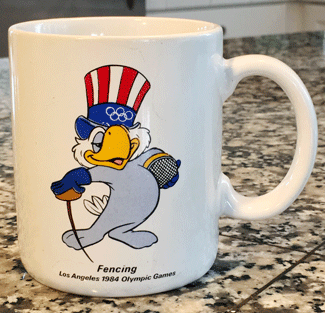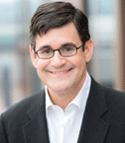With the success of the anti-clutter book, “The Life-Changing Magic of Tidying Up,” our columnist wonders if there’s a digital version where deleting files can have miraculous results.
_______________________________________________________________________________________
By Brad Berens
Hi, I’m Brad, and I’m an information hoarder. Here’s an example.
During this year’s Winter Olympics in South Korea, I was drinking my morning coffee from a mug that I’ve owned since the 1984 Los Angeles Summer Olympics.
 Back then, my high school sport was fencing, which was as obscure as sports got in the U.S. It was thrilling that the world’s best fencers were coming to town to compete — and we had tickets! The coffee mug, featuring “Sam the Olympic Eagle” holding a foil, was my favorite of several souvenirs that I’ve kept ever since.
Back then, my high school sport was fencing, which was as obscure as sports got in the U.S. It was thrilling that the world’s best fencers were coming to town to compete — and we had tickets! The coffee mug, featuring “Sam the Olympic Eagle” holding a foil, was my favorite of several souvenirs that I’ve kept ever since.
But that doesn’t mean that I’ve been slurping coffee out of that mug since the eighties. For most of that time my Sam the Olympic Eagle mug was too precious for me to risk it meeting the shattered destiny of all coffee mugs. Sam found its way, safely wrapped, into a box that moved from garage to garage over the years.
Then, a few months ago, I stumbled across Sam while searching for another hermetically sealed possession. I wondered, “What am I saving this mug for?” Neither of my kids fence or are likely to start. I hadn’t found myself struggling vainly to remember that Olympics through the years. It’s a coffee mug: if it breaks, it breaks.
But as I washed Sam before releasing it to kitchen cabinet gen-pop, I found myself wishing to protect and preserve the mug in a new way. If only, I mused, 3D scanning technology was just a few years more advanced. I could use my smart phone to scan an ultra high definition copy of the mug and store it — just like I scan documents and store them in Evernote — so that when the original eventually breaks I’ll be able to 3D print a fresh copy.
At this point, it would be easy to fall down a philosophical rabbit hole thinking about whether or not the freshly-printed copy of my Sam the Olympic Eagle mug would be as satisfying as the original, whether or not it would feel authentic, whether or not it would evoke the same memories as the original or if instead I’d remember the act of printing it out rather than buying the original at a stand in Long Beach in 1984. Let’s leave these questions for another column.
_________________________________________________________________________________________________
When it comes to information, our choices aren’t binary — do it now or do it later. Instead, they are three-fold: do it now, never do it, or do it later. Ideally, 90% of the time we’ll choose either do it now or never do it. But that’s hard.
_________________________________________________________________________________________________
Instead, I want to focus on my aversion to the possibility of loss (even for something as trivial as a coffee mug, albeit one with sentimental value), how I wanted to use technology to avoid that loss by transforming the mug into digital information, and some unintended consequences of those two things in combination.
If you’re even passingly familiar with behavioral economics, then you know that we humans are more afraid of loss then we are greedy for gain. Losing a dollar on the street is more negative than finding a dollar is positive.
With physical things, there are self-limiting constraints on what we can keep around because we’re afraid to squander value: nobody has that large a home. If, like the mother of an old friend of mine, you cannot bear to throw a newspaper away until you’ve read every last page, then you quickly find yourself buried in newspapers that fill up half your house, and your family stages an intervention.
There’s a thin line between wanting to stay informed and being a hoarder. It’s not only hoarders who get overwhelmed by stuff, which is why Marie Kondo’s book, The Life-Changing Magic of Tidying Up (the short version of which is “throw more junk away”) was a bestseller.
We run out of physical space for our things, but I think that something similar is true for information. Many of us, myself included, are information hoarders.
I’m not talking about buying a bigger hard drive. Instead, I’m talking about the cognitive burden of information hoarding. If we never throw any data away, are we invisibly engulfing ourselves in a virtual mountain of old emails, receipts, documents, photos and more? If I scan a handwritten note and stick it in Evernote, then I’d better name the note and attach a tag or the note will be just as lost as if I’d tossed it onto a pile of physical papers.
That act of processing, though, takes time and mental energy that I won’t have later. That is the dangerous moment when I don’t have time to process something but think that I will have time later on, so I store the document on my hard drive, mark the email as unread, add something to my to-do list, bookmark a website, send an article to Instapaper… the list goes on.
When it comes to information, our choices aren’t binary — do it now or do it later. Instead, they are three-fold: do it now, never do it, or do it later. Ideally, 90% of the time we’ll choose either do it now or never do it.
But that’s hard.
Information hoarding is, I think, a more useful term than “information overload” because we know what to do with hoarders but we don’t know what to do with people who are overloaded.
In part, this is because the “overload” metaphor isn’t accurate: with an overloaded circuit you just hit the breaker and start over. An overloaded vehicle can’t go anywhere, so you have to take things out in order to move forward. These things are not true of managing and storing too much information: there is no mental circuit breaker, and we still carry on, just not happily or efficiently.
_________________________________________________________________________________________________
There’s a thin line between wanting to stay informed and being a hoarder. It’s not only hoarders who get overwhelmed by stuff. We run out of physical space for our things, but I think that something similar is true for information. Many of us, myself included, are information hoarders.
_________________________________________________________________________________________________
Clay Shirky has famously argued that our problem isn’t information overload: it’s filter failure. But this suggests that there’s a technological solution to a technological problem, setting us up to muddle through an information arms race. Shirky’s solution doesn’t tackle the dysfunctional behavior of keeping too much information lying around just because it’s effortless to do so.
Neuroscientists like Daniel Levitin talk about a limited daily supply of decision-making energy, so we have to budget our attention the way we budget our money, which is why, for a famous example, President Obama only wore blue or grey suits. But that doesn’t deal with the adjacent problem of keeping information around because you think that eventually you’ll get around to processing it. (See also the problem of inbox zero and the last-ditch solution of declaring email bankruptcy.)
If we stick with the economic metaphor of attention being a currency that you spend (you “pay attention”), then having too much information lying around waiting in vain for you to someday deal with is an attention tax just like having your smart phone anywhere near you, even if it is face down and turned off, drains your brain.
Economists talk about opportunity costs, which means that if you pick one of three alternatives then you are missing the potential gain from the two things that you didn’t pick. In his remarkable 2005 book, The Paradox of Choice, Barry Schwartz applied this to satisfaction: the infinite choices of online shopping also come with infinite opportunity costs, so you’re rarely happy with what you choose.
There’s a corollary to opportunity costs when it comes to information hoarding: “opportunity backup.”
As anybody who has seen my office can relate, I am not a neat freak, so I’m not saying that there’s a digital version of the so-called life-changing magic of tidying up. Instead, I’m making a narrower argument. It’s not the piles of information that create the cognitive burden: it’s the piles of unprocessed things.
Just like hoarding physical things takes up space in your home so you have less space to live in, information hoarding takes up mental space so you have less energy to think.
At least that’s the idea. Once I get through all this email I’ll have time to decide if it’s really true.
__________

Brad Berens is the Center’s Chief Strategy Officer.
See all columns from the Center.
February 28, 2018

